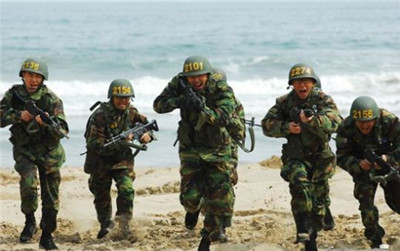Conscripts in South Korea
韩国兵役
Blood, sweat and tears
血,汗,泪
A string of egregious abuses fuels fresh calls to reform the army
一系列虐待丑闻骇人听闻,掀起了军队改革的新呼声
EVERY Sunday, one in five families in South Korea settles down to “Real Men”, a reality television show that thrusts pop stars, comedians and actors into the country's armed forces. It has proved wildly popular in a country that is still technically at war with North Korea and that requires all able-bodied men to complete at least 21 months of military service. Women, who do not serve, say it is a peek into their sons' and brothers' transition to manhood. What they see is rigorous training, pride and plenty of brotherhood.
在韩国,每逢周日,有五分之一的家庭会专心致志地观看电视真人秀《真男人》。这档节目会把明星和演员送进军队。这个国家理论上仍处于与朝鲜的战争状态,需要该国每位身体达标的男子服役21个月,因此这档节目确实广受欢迎。女子不用服役,她们说,这档节目使她们得以一瞥儿子兄弟成长为男子汉的过程。在节目里,她们看到的是严格的训练,荣誉精神,兄弟情谊。
Yet the camaraderie of the show is in stark contrast to a more bruising reality for some conscripts. In recent months reports have trickled out of South Korea's barracks of beatings, humiliation and verbal abuse. News of a young conscript's death surfaced in August. Yoon's alleged abusers (his full name has not been divulged) were fellow conscripts who had themselves been abused by a sergeant. They are said to have force-fed Yoon toothpaste, rubbed an irritant onto his genitals and made him lick their spit off the ground. After beatings, they revived him with an intravenous drip. Then they beat him again.
但节目中表现的战友情谊与某些士兵经历的残酷现实截然相反。近几月来,一些报道揭露了韩国军营中的殴打,羞辱,辱骂现象。八月,一位士兵死亡的新闻浮出水面。被控实施虐待(未透露死亡士兵的全名)的士兵是尹某的战友,他们自己也被军官虐待过。据说他们让尹某吞牙膏,给他的下身擦上刺激性药品,强迫他舔光他们吐在地上的痰。在殴打过后,他们利用静脉注射让他苏醒。然后再次殴打。

The case has shocked South Koreans—as did an incident in 2011 when a badly bullied conscript went on a shooting rampage, killing four people; and another in 2005 when a soldier killed eight others with a grenade after being tormented by them. That year, an army captain was arrested for forcing 200 conscripts to eat turds as punishment for dirty latrines. Since January around 350 cases of abuse have been put to the National Human Rights Commission, a state outfit. Many more, say activists, go unreported.
此案震惊韩国——轰动性不亚于2011年一位受尽欺辱的士兵疯狂扫射杀死四人,以及2005年另一位士兵受折磨后用手榴弹炸死八人。那年还有一位军官以厕所打扫不净为由强迫200位士兵食粪,他因此被捕。自一月起有大约350起虐待案件被提交到了国家机关——国家人权委员会。人权活动家说,还有更多被掩盖起来了。
Yoon's case of hazing was uncovered by a civic group, the Centre for Military Human Rights Korea. Its director, Lim Tae-hoon, decries a “systematic attempt at a cover-up”. The army's chief of staff has resigned. The defence ministry has called for a permanent human-rights commission for the armed forces to help prevent further abuse. And the entire army suspended duties recently for a daylong session on human rights. This month military prosecutors changed the charge against four of the soldiers alleged to have killed Yoon from manslaughter to murder.
尹某受虐案是由民间组织韩国军人权益中心所揭露的。中心主任李泰勋谴责了韩国军方「有组织地掩盖真相」。韩国陆军总参谋长已为此辞职。国防部要求军方成立永久的人权委员会,以防未来仍有虐待事件发生。全军上下停止执行任务,参加为期一天的人权培训。本月军方的检察官把对四名被控害死尹某的士兵的指控从过失杀人提高到了谋杀。
Calls for sweeping reform to barrack-room culture are all too familiar. Physical abuse in South Korea's 650,000-strong conscript army has long been tolerated as a means to toughen troops against a northern army thought to be twice as large. Two military coups and a long period of martial law (under the current president's late father, Park Chung-hee) have given the army exceptional leeway in how it conducts its affairs. It is largely immune from democratic oversight.
对军营文化进行广泛改革的呼吁是人们再熟悉不过的了。韩国65万多人的部队中,身体虐待长久以来受到容忍,为了能抗衡人数两倍于其的朝鲜部队,这是一种锻炼士兵的方法。历史上的两次军事政变以及长期实施戒严法(正是在现任总统朴槿惠的父亲朴正熙治下)也给军方留下了特别的行事余地。军队很大程度上是免收民主监督的。
That means tormentors are not properly punished. Around 150 bodies remain in the army's morgue. Their cause of death is given as “failure to adjust to military life”. But relatives refuse to collect the bodies because they want an independent investigation to confirm the cause of death. Military courts, says Choe Kang-wook, a former lawyer in the army, are the “shame of South Korea”. High-ranking generals without legal knowledge preside over court proceedings.
这就意味着施暴者并未真正得到惩治。军队的停尸间里还留着150具尸体。军方给出的死亡原因是「没能适应军营生活」。但亲属们要求进行独立调查确认死因,所以拒绝下葬。曾在军队中任律师的Choe Kang-wook说,军事法庭就是「韩国的耻辱」。毫无司法常识的高级将军掌握着审判程序。
As more rich countries drop conscription, South Korea has become an outlier, says Kim Du-kwan, a former minister who is now fighting to end it in his country, too. He takes the North Korean threat seriously. But what good, he asks, is “wielding a gun and not much more” when military strength is now based on sophisticated technology? He frets that abusers foment internal division, too. The armed forces have long used national security as a reason for keeping conscription and fending off civilian oversight. Proponents of a standing army, like Mr Kim, argue that South Korea's security would be better served by just the opposite.
曾经的部长金斗官如今正致力于结束韩国的义务征兵制,他说越来越多的富裕国家抛弃了义务征兵,韩国已经成为异类。他严肃对待来自朝鲜的威胁。但他反问说,在军事实力以高新科技为基础的今天,「用好一杆枪是不是比数量堆积更好呢?」他也为军中施虐者造成的内部分裂烦恼。军方一直以国家安全为由维持义务征兵制不动,并避开民间的监督。而金斗官等建设常备军的支持者认为,反军方之道行之,才能更好地守护国家安全。译者:周鼎烨
译文属译生译世












